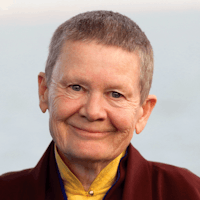My experience with forgiveness is that it sort of comes spontaneously at a certain point and to try to force it, it’s not really forgiveness…
Pema Chödrön

My Experience with Forgiveness
Topic: Virtue, Morality, & Ethics
My experience with forgiveness is that it sort of comes spontaneously at a certain point and to try to force it, it’s not really forgiveness. It’s Buddhist philosophy or something spiritual jargon that you’re trying to live up to, but you’re just using it against yourself as a reason why you’re not okay.
Pema Chödrön, born Deirdre Blomfield-Brown on July 14, 1936, in New York City, grew up on a farm in New Jersey. She attended Miss Porter's School before earning a degree in English literature from Sarah Lawrence College and a master’s in elementary education from the University of California, Berkeley. She married at 21 and had two children before experiencing two divorces. Her spiritual journey led her to study Buddhism with Lama Chime Rinpoche in London and Chögyam Trungpa Rinpoche in the United States. In 1974, she was ordained as a novice nun by the Sixteenth Gyalwa Karmapa, Rangjung Rigpe Dorje, and in 1981, became the first American woman fully ordained in the Vajrayana tradition.
Chödrön played a key role in bringing Tibetan Buddhism to the West. In the early 1980s, Trungpa Rinpoche appointed her director of the Boulder Shambhala Center in Colorado. She later moved to Gampo Abbey in Nova Scotia, the first Tibetan Buddhist monastery in North America for Western students, becoming its director in 1986. Recognized as an acharya (senior teacher) in 1993, she continued teaching despite health challenges, including chronic fatigue syndrome. Her books, such as When Things Fall Apart (1996) and No Time to Lose (2005), explore resilience, mindfulness, and compassion, emphasizing shenpa, the habitual grasping that leads to suffering.
In 2020, Chödrön retired from her role as acharya within Shambhala International, citing concerns over the organization’s direction. She continues to teach, lead retreats, and study with her teacher, Dzigar Kongtrul Rinpoche. Recognized for her contributions to Buddhist practice, she received the Global Bhikkhuni Award in 2016. Though she stepped back from institutional leadership, she remains a guiding voice in contemporary Buddhism, emphasizing the power of mindfulness and compassion in daily life.
Chödrön, Pema. Quoted in "Spontaneous Forgiveness." Madison CT Patch, 22 June 2012, Madison-ct.patch.com. Quoted passage.

Pema Chödrön
Theme: Forgiving

About This Pema Chödrön Quotation [Commentary]
Pema Chödrön begins simply: “My experience with forgiveness is that it sort of comes spontaneously at a certain point.” In this, she does not define forgiveness as a decision or achievement, but as something that arises on its own. Her use of “sort of” and “at a certain point” reflects the unstructured, personal nature of the process. Rather than framing forgiveness as a practice to master, she describes it as something that happens when we are no longer trying to make it happen.
This becomes even clearer in her warning that “to try to force it, it’s not really forgiveness.” For Pema Chödrön, the moment we attempt to manufacture forgiveness—perhaps to align with an idea of what we think a spiritual person should do—we lose touch with its reality. “It’s Buddhist philosophy or something spiritual jargon that you’re trying to live up to,” she writes, and this pressure to conform can backfire. Instead of freeing us, it becomes “a reason why you’re not okay,” reinforcing self-doubt rather than resolving it.
Her final phrase, “you’re just using it against yourself,” brings the concern into sharp focus. Forgiveness, when forced, risks becoming another way we judge ourselves. Rather than allowing it to “come spontaneously,” we may turn it into a tool of self-blame. Pema Chödrön’s words encourage a different approach—one that waits, listens, and does not push. Her caution is clear: unless forgiveness is unforced, it isn’t forgiveness.
Additional Pema Chödrön Quotations
“There is a simple practice we can do to cultivate forgiveness. First we acknowledge what we feel—shame, revenge, embarrassment, remorse. Then we forgive ourselves for being human. Then … we let go and make a fresh start.”
—Pema Chödrön, From Inspiring Forgiveness, quoting her plain, practice‑based invitation.
“Forgiveness, it seems, cannot be forced. When we are brave enough to open our hearts to ourselves, however, forgiveness will emerge.”
—Pema Chödrön, Shared via Loving Sangha (Facebook), emphasizing natural emergence when we soften internally, facebook.com.
“All over the world, everybody always strikes out at the enemy, and the pain escalates forever. … Every day we can ask ourselves, ‘Am I going to practice peace, or am I going to war?’”
—Pema Chödrön, From When Things Fall Apart, reminding us forgiveness changes our moment‑to‑moment choices.
Resources
Related Quotes
Copyright © 2017 – 2025 LuminaryQuotes.com About Us